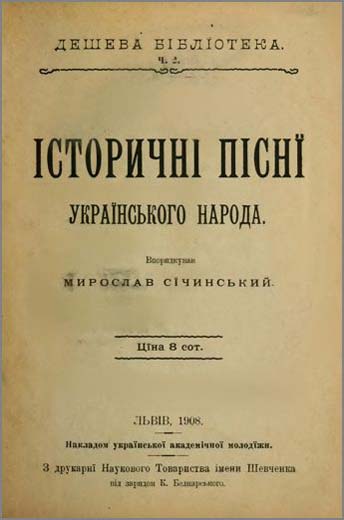Historical songs
Historical songs. A genre of folk songs that presents historical events and individuals in a generalized, artistic manner with details, names, and facts that may be inaccurate. Ukrainian historical songs appeared at the same time as the dumas, and perhaps even preceded them. They differ from the dumas in that they describe concrete historical events and figures; their story line is less developed, their emotive range is greater, and in them the lyrical element prevails over the epic element. Their strophe is rhythmically structured and consists usually of two or four lines. The melody is encompassed in one couplet and is repeated without modification in subsequent couplets.
The oldest cycle of historical songs dates back to the 16th century and depicts the Cossacks' struggle against the Tatars and Turks; the best known are the songs about Baida (Dmytro Vyshnevetsky) of 1564, the capture of Varna of 1605, and the siege of the Pochaiv Monastery of 1675. A second cycle consists of songs about the Cossacks' struggle against Poland; the best known are the songs about Bohdan Khmelnytsky, the Battle of Zhovti Vody, the Battle of Berestechko, the curse on Khmelnytsky for the Tatar captivity of 1653, and about Danylo Nechai, Maksym Kryvonis, and Stanyslav Morozenko. A third cycle deals with Russian oppression and includes songs about construction work on the Saint Petersburg canals, the destruction of the Zaporozhian Sich, and the death of a Cossack in Russian captivity ('Stoït’ iavir nad vodoiu’). A fourth cycle consists of songs about the Haidamaka uprisings and includes songs such as the ballad about the cooper's daughter (Bondarivna) and the songs about Sava Chaly, Maksym Zalizniak, and Mykyta Shvachka. There is also a large corpus of songs describing Cossack daily life: the relations between a Cossack and the community, with his family, and particularly with his beloved (‘Oi, pushchu ia konychen’ka’). Songs on social questions constitute a special group: they deal with the struggle among different Cossack strata (‘Oi, nastupaie ta chorna khmara’), with corvée and the oppression and resistance of the common people, and include songs about Ustym Karmaliuk, Lukian Kobylytsia, and Oleksa Dovbush.
The oral tradition of Western Ukraine has preserved the memory of L. Kossuth and the Hungarian revolution of 1848, and Austria's occupation of Bosnia. There are Hutsul songs and Boiko songs (see Boikos) about the First World War, sung in a kolomyika meter of 4 + 4 + 6 syllables, songs about emigrating to America, and songs about seasonal migrant work.
The events following the Revolution of 1917 were widely reflected in new dumas and songs such as the duma about the destruction of Liutenka by the Bolsheviks (‘U vivtorok vrantsi-rano ...’). The Second World War, in particular the struggle of the Ukrainian Insurgent Army, is also reflected in the oral tradition. Songs about recent events, however, are not circulated widely and are quickly forgotten.
The best-known annotated study of Ukrainian historical songs is the two-volume collection compiled by Mykhailo Drahomanov and Volodymyr Antonovych, Istoricheskie pesni malorusskogo naroda (Historical Songs of the Little-Russian People, 1874–5). Drahomanov's later compilations of and valuable commentaries to Novi ukraïns’ki pisni pro hromads’ki spravy (New Ukrainian Songs on Social Topics, 1881) and Politychni pisni ukraïns’koho narodu 18–19 st. (Political Songs of the Ukrainian People in the 18th and 19th Centuries, 2 vols, 1883, 1885) are other valuable contributions to the study of historical songs.
BIBLIOGRAPHY
Maksimovich, M. Ukrainskie narodnye pesni (Moscow 1834)
Plisets’kyi, M. Ukraïns’ki dumy ta istorychni pisni (Moscow 1944)
Ukraïns’ki narodni dumy ta istorychni pisni (Kyiv 1955)
Rodina, M. ‘Istorychni pisni,’ in Ukraïns’ka narodna poetychna tvorchist’, vol 1 (Kyiv 1958)
Istorychni pisni (Kyiv 1961)
Stel’makh, M. (ed). Narodni perlyny (Kyiv 1971)
Spivanky-khroniky (novyny) (Kyiv 1972)
Petro Odarchenko, Danylo Husar Struk
[This article originally appeared in the Encyclopedia of Ukraine, vol. 2 (1989).]

